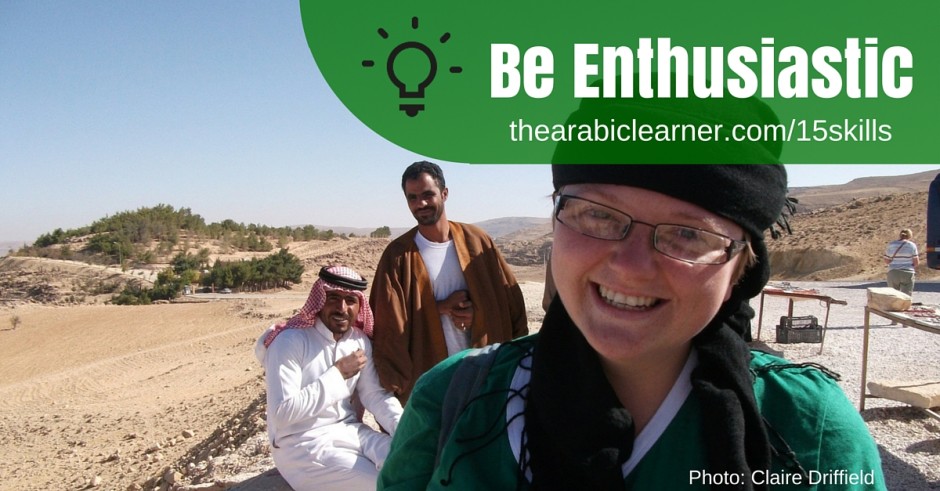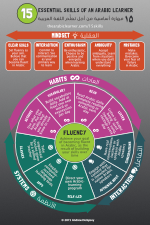Enthusiasm and the emotion of learning Arabic
Be enthusiastic. Choose a positive, energetic approach to learning Arabic. This will bring about a genuine change in how you experience the process of acquiring the language. It will heighten your ability to receive and process Arabic input, it will accelerate your ability to grasp and learn new things, and it will give you resilience and persistence when the journey seems long. It will also make the process much more enjoyable and fascinating.
This article is based on the 15 Essential Skills of an Arabic Learner.
Enthusiasm is more than commitment
Several years into my Arabic learning experience I found myself committed to learning Arabic, but not very enthusiastic about it.
I lived in one of Cairo’s poor areas. I enjoyed the excitement, the constant activity, the closeness of people, and the endless variety of experiences. I was (and perhaps still am) an experience junkie. I love being exposed to life in all of its different modes.
To experience my life in the slums to its fullest, I needed Arabic. I knew that. But having already spent several years studying the language, I was running out of enthusiasm. I was still going up to the American University in Cairo on the metro (subway) every day for Arabic classes (at that time it was located in Tahrir Square in downtown Cairo), but learning the language had become a necessity, not a pleasure.
At that point, I began to notice that my progress became noticeably slower. Having lost my enthusiasm, I became less effective in learning Arabic.
The key of motivation and attitude
Motivation and attitude are crucial to success in any endeavor. Your motivation affects and is directly affected by your attitude. As Lou Holtz once said, “Ability is what you’re capable of doing. Motivation determines what you do. Attitude determines how well you do it.”
Holtz is a former American football coach, not a language learner, but the principle applies equally to your goal of learning Arabic. Having an enthusiastic attitude as you approach your Arabic learning will determine, at least in part, how well you do it.
I asked Laila al-Sawi, co-author of several books on teaching Arabic and veteran Arabic teacher at the American University in Cairo, what she felt was one of the key factors that separated students who actually learned Arabic from those who tried but did not succeed. Her answer was:
“Motivation. Motivation makes everything move forward. Motivation helps the students notice errors, their own and other students, and learn from them.1“
This certainly matched my own experience. It is interesting to note the key factor that motivation plays in helping students to notice their errors (and those of other people), and to learn from them. This kind of cognitive processing is an important part of learning Arabic. When my level of enthusiasm is low, I am often unmotivated to expend the energy needed to notice and process errors. When that happens, I stop learning.
The emotions of learning Arabic
Learning Arabic can be an emotional undertaking. It is often emotional because of the hard work required and the frustration when you don’t feel like you’re making any progress. I remember many long nights of poring over Arabic texts with my dictionary, almost reduced to tears as I tried to look up a word that I simply could not remember. According to Dr. Kirk Belnap, Director of the National Middle East Language Resource Center at Brigham Young University, many Arabic learners experience high levels of emotion. In addition to the frustration of navigating a new language, Arabic is often studied in a different university or country than where the learner grew up, creating stress. Perhaps even more prominent is the “messing with your mind” effect:
“Language learning messes with your mind. You find your very identity challenged. Especially at that stage where you can’t express yourself anywhere near what you want to be able to do. If you consider yourself a person who is funny, you’re often not able to be funny, and so forth.2“
That rang true with me on many levels. Over the years I have found myself sitting through some conversations in Arabic where I wanted to say something funny or witty, but didn’t have the skill to do so. Rather than attempt a joke and fail, I would simply stay quiet. My personality – as seen by others – is at times very different in Arabic than it is in English for this reason.
With all of these emotional challenges that make maintaining a high level of enthusiasm difficult, Dr. Belnap says,
“Self-awareness, self-regulation, especially emotional self-regulation is key to learning Arabic3“
When you are self-aware, you are able to recognize your own emotional ups and downs. As you learn to self-regulate those emotions, you will be able to maintain a stronger level of enthusiasm and motivation as you learn Arabic. It will give you resiliency and persistence to get you through the times when it’s hard.
Find Arabic fascinating
A positive, energetic approach to learning Arabic will enable you to learn faster and more effectively.
Stay enthusiastic about your Arabic learning. Eagerly pursue new vocabulary, new understanding, and new levels of communication.
“We’re not child learners, we’re adult learners, but you have to approach it with that same kind of fascination. Don’t look at it as a chore… find it fascinating.” (David Wilmsen4)
You can do this!
Homework
1. Where is your level of motivation and enthusiasm for learning Arabic right now? Where would you like it to be?
2. Think of at least one way to help yourself “emotionally self-regulate”. For some people, that may mean finding other Arabic learners that you can be in touch with. For others it might be setting a series of small goals and working toward them. What works for you?



 RSS - Posts
RSS - Posts
One thought on “Be enthusiastic when learning Arabic”
Comments are closed.